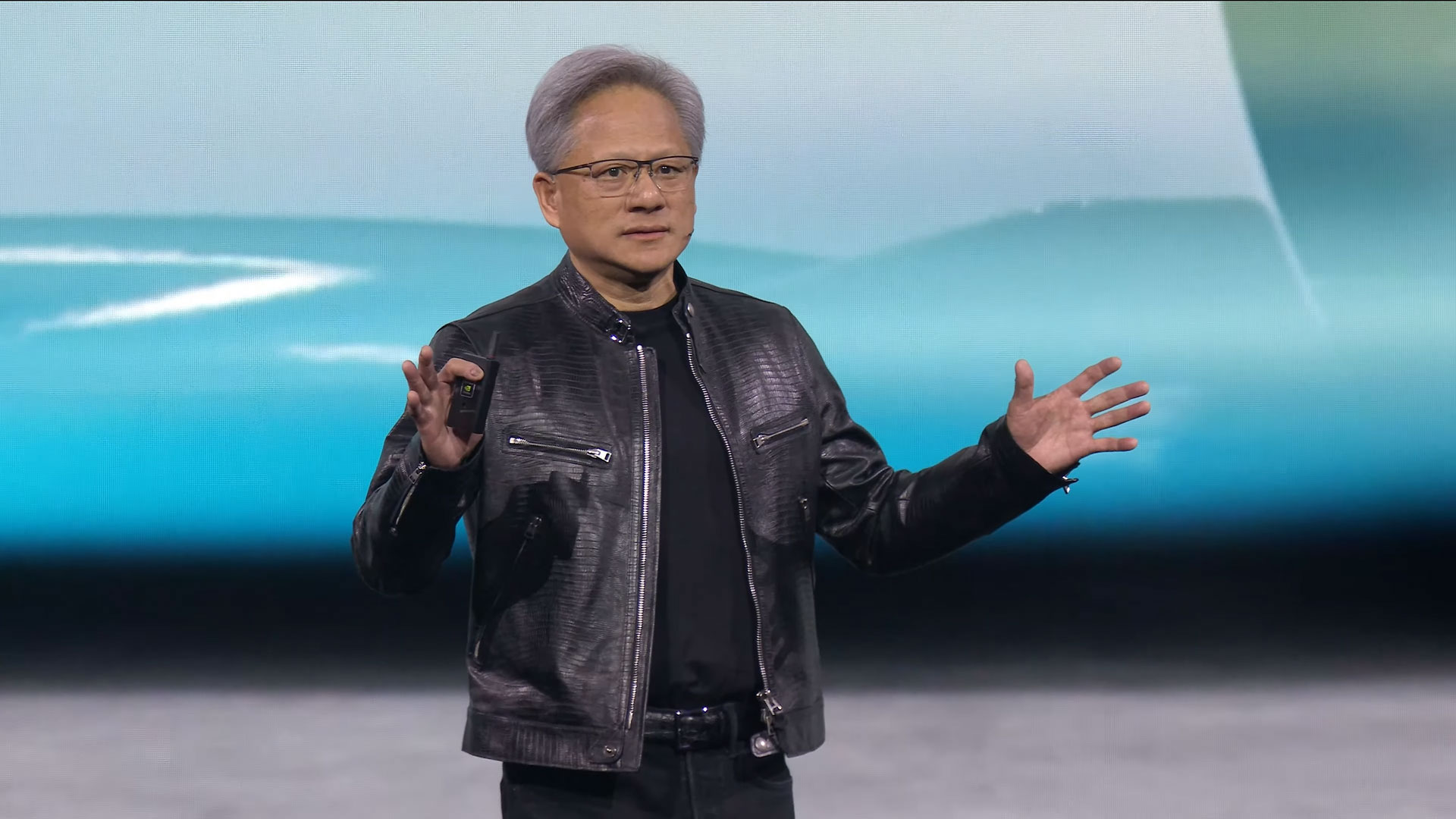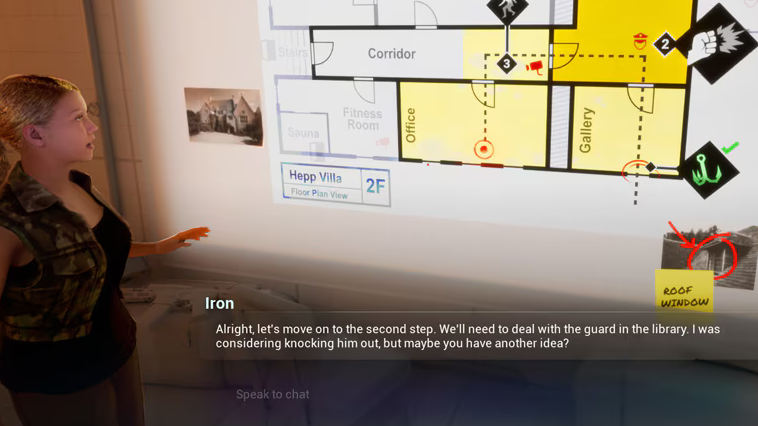RTX off, AI on: Jensen says we'll see fully AI-generated games in 5-10 years
GPU inception, with graphics cores processing AI workloads to generate graphics again.

The Nvidia GPU Technology Conference this week has provided some exciting news, including the reveal of Nvidia's next-generation Blackwell AI GPU, the B200. CEO Jensen held a Q&A session with the press later in the conference to field additional questions and provide further insights into where he sees things headed. One of the questions concerned the potential for AI-generated games, which Jensen says he expects to see within five to ten years. I'm paraphrasing here, but the essence of the question was: When do you think we could see fully AI-generated games?
The answer might surprise some, and represents something of an inception point for GPUs. Graphics Processing Units have been used to render games via rasterization for decades now, and more recently they've added ray tracing hardware to try to improve the visual fidelity. But AI-focused GPUs have now put all of the number-crunching power to a different task, creating ever larger and more powerful neural networks to generate content — tools like Stable Diffusion, Chat-GPT, Chat With RTX (now rebranded as ChatRTX, incidentally), Sora video generation, and more.
Jensen foresees a future in which GPU-powered AI tools could come full circle and put all that processing power to use in generating computer graphics again. But note the wording: generating graphics rather than rendering. And he thinks that an AI-generated gaming future could arrive within the next ten years, with early attempts potentially showing up within five years.
Granted, the amount of computational power behind Sora, both for training and generating minute-long video clips, is currently far beyond anything we'll see in a desktop PC within the next decade. There are tens of thousands of GPUs used by OpenAI for tools like Sora, so even if desktop GPU performance doubled every generation, we'd still only be looking at the computational equivalent of perhaps 32 RTX 4090 GPUs in our desktops a decade from now.
I don't think anyone is going to type in a simple prompt like, "Create an action-RPG pirate game with realistic graphics," and instantly get a fully playable and enjoyable game on their own PC within ten years, or perhaps even twenty years. But by the same token, we've already seen AI generate images, sound, 3D models, video, and code, and the quality of the generated content continues to improve with every iteration of the models. Ten years from now, it's easy to imagine AI-powered tools that can create models, levels, code, stories, and other assets in a matter of minutes. Push the initial computation up to cloud computing, and the on-the-fly generation of games doesn't feel nearly as out of reach.
I think with almost almost everything in technology, the S curve is not longer than a decade once it becomes true, once it becomes practical and better.
Jensen Huang
Here's the actual question and answer, edited for clarity.:
Bilawal Sidhu asked, "How far do you think we are in this world where every pixel is generated at real-time frame rates? And what is your vision for gaming and non-gaming experiences in that new paradigm?"
Jensen: "I think with almost almost everything in technology, the S curve is not longer than a decade once it becomes true, once it becomes practical and better. And, of course, ChatGPT is not only practical; in most cases, it's better. I think it's less than ten years away. In ten year's time you're at the other end of that S curve. In five years from now, you're probably right in the middle where everything is changing in real-time, and everybody's going, 'Oh, look at that, this is happening.' And so you just got to decide, are we two years into it, into that ten years? Probably, we're probably already two years into it. And so I would say that within the next five to ten years, somewhere in between, it's largely the case."

In the interim, Nvidia and others are exploring AI-powered NPCs and new ways of interacting with game worlds. These currently feel stilted and artificial, at least the ones I've tried, but they also feel like something that could greatly enhance gaming worlds with only a moderate amount of effort. Ubisoft Neo, as an example, was just shown at this year's Game Developers Conference, and we could see many indie games within the next year that include AI-powered NPCs. Nvidia has been talking about ACE (Avatar Cloud Engine) for a couple of years now, and it continues to improve each time it gets demonstrated.
There are also plenty of examples of people creating games already with a relatively minimal effort — not good games, necessarily, but again, this is using version 1.0 tools. Even a lousy game created by AI in less than 10 minutes is a lot more than most people could manage on their own, and iterating on ideas to create better games can happen far more quickly. As Jensen also noted in the Q&A session, AI is democratizing access to writing code — you no longer need to go to years of school to be able to write code and scripts.
So will we eventually have DLSS 10 creating neurally rendered games in the future? The name might change, but the vastly increased use of AI tools to help create content is already happening. Whether that will eventually result in better games remains to be seen.
Get Tom's Hardware's best news and in-depth reviews, straight to your inbox.

Jarred Walton is a senior editor at Tom's Hardware focusing on everything GPU. He has been working as a tech journalist since 2004, writing for AnandTech, Maximum PC, and PC Gamer. From the first S3 Virge '3D decelerators' to today's GPUs, Jarred keeps up with all the latest graphics trends and is the one to ask about game performance.
-
pulse7 "Jensen says we'll see fully AI-generated games in 5-10 years" And in 7 years we'll see fully AI-generated GPUs and in 10 years fully AI-generated NVIDIA-like company...Reply -
brandonjclark The problem with shareholder value expanding so quickly, and this is a small price to pay, is that as a company your job is to HOLD it there.Reply
A new bar has been set for NVidia, and they've got to keep returns high.
Jensen HAD to have an event like they did the other day. -
The Historical Fidelity So now we have AI writing code for us??? How many human generations will it be before no one on earth knows how to read or write code and relies on AI completely to code. The AI can write anything it wants and humans would have no way to know if it’s malicious.Reply
I guess we better start coming up with machine prayers in order to appease the machine spirits that will be controlling our tech. (A little Warhammer 40k reference lol) -
PEnns And quite possibly in the very near future, AI will create its own programming language and the AI cheering humans will have no idea how to use or inspect that code!Reply
All hail Skynet....:confused:
-
HaninTH What is up with the forced white background on the TH main page? That is very annoying!:mad:Reply -
Neilbob My inner grump came to the surface especially quickly today, and all it could muster was:Reply
UosZ4mXL8EIView: https://youtu.be/UosZ4mXL8EI -
hotaru251 Reply
even if machines/ai replace humans in 100% of jobs...people will have hobbies.The Historical Fidelity said:How many human generations will it be before no one on earth knows how to read or write code and relies on AI completely to code.
and if your hobby is coding you could learn to do so at your leisure.
